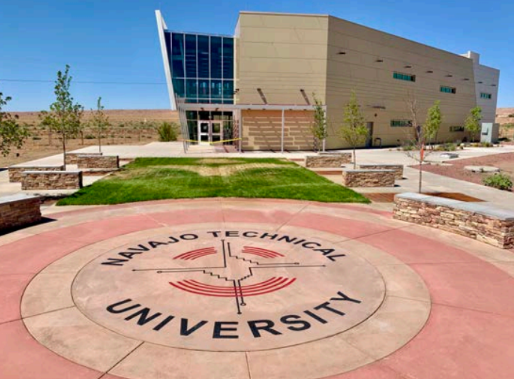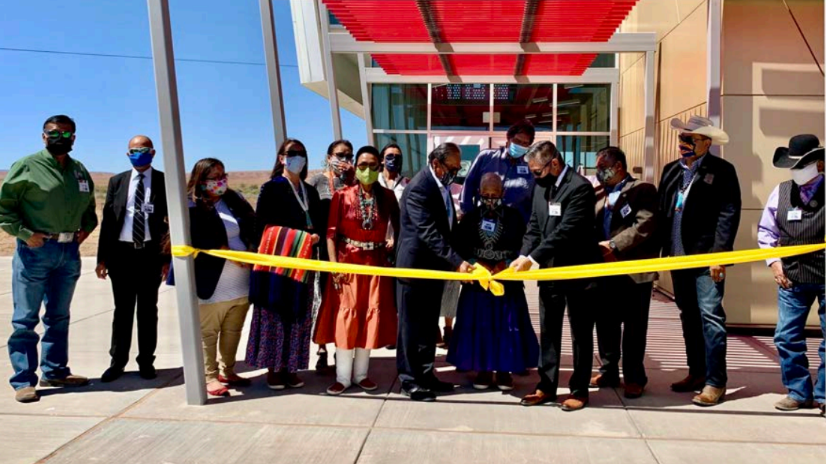
- Details
- By Native News Online Staff
CHINLE, Ariz. — Navajo Technical University (NTU) is growing. On Thursday, NTU opened a satellite facility 130 miles from its main campus in Crownpoint, N.M. in Chinle, Ariz.
On hand for Thursday’s ribbon-cutting ceremony the new Chinle Academic Facility was Navajo Nation Vice President Myron Lizer.
"We're honored to join Navajo Technical University leadership and students today to celebrate another milestone. The University offers some of the best higher education programs for Navajo and Native American students. The new site will provide the local community of Chinle and surrounding communities with more pathways to higher education," Lizer said.
 Navajo Nation Vice President Myron Lizer, Navajo Technical University Board of Regents and administrators, 24th Navajo Nation Council Delegates Eugene Tso and Kee Allen Begay, Jr., and Arizona State Rep. Arlando Teller during the NTU Chinle Academic Facility ribbon-cutting ceremony on Sept. 3, 2020 in Chinle, Ariz.
Navajo Nation Vice President Myron Lizer, Navajo Technical University Board of Regents and administrators, 24th Navajo Nation Council Delegates Eugene Tso and Kee Allen Begay, Jr., and Arizona State Rep. Arlando Teller during the NTU Chinle Academic Facility ribbon-cutting ceremony on Sept. 3, 2020 in Chinle, Ariz.
Construction of the 6,000 square-foot facility began in 2017 along Navajo Route 102 and State Highway 191, approximately one mile south of the Chinle Comprehensive Health Care Facility.
The new facility will contribute to professionals' continuous demand across the country and the Navajo Nation, according to NTU President Dr. Elmer Guy. He said the new site reflects the positivity of growth and development and provides a quality environment so students can obtain careers in the ever-advancing fields of arts, science, business, and technology.
Vice President Lizer was joined by NTU Board of Regents Tom Platero, Dr. Delores Greyeyes, Dr. Carolyn Morris, Roselyn John, Gloria Grant, Roland Begaye, NTU President Dr. Elmer Guy, Vice President Jason Arviso, NTU administrators, 24tH Navajo Nation Council Delegates Eugene Tso and Kee Allen Begay, Jr., Arizona State Rep. Arlando Teller, and residents to mark the completion of the NTU Chinle campus.
Navajo Technical University's mission is to provide college readiness programs, certificates, associate, baccalaureate, and graduate degrees. Students, faculty, and staff provide value to the Diné community through research, community engagement, service-learning, and activities designed to foster cultural and environmental preservation and sustainable economic development.
The University is committed to a high quality, student-oriented, hands-on-learning environment based on the Diné cultural principles: Nıtsáhákees, Nahat' á, Iıná, Sıh Hasın.
“The Navajo Technical University has made enormous strides to serve Navajo communities since their establishment. Our tribal colleges on the Navajo Nation consider a community-based, student-centered, and holistic approaches to education and student support, making our higher educational institutes remarkable. They are also driven by our Navajo culture and tradition to help students succeed,” President Jonathan Nez said.
"The Nez-Lizer Administration commends all the hard-working staff members of Navajo Technical University and Chinle's community to collaborate and make the road to higher education success for Navajo students and families during the COVID-19 pandemic," added Vice President Lizer.
More Stories Like This
Native Students Can Win $5,000 Scholarship, International Distribution in Pendleton Design ContestAmerican Indian College Fund Raises Alarm Over Plan to Shift Native Programs Away From the Dept. of Education
MacKenzie Scott Foundation Gives $5 Million Contribution to Little Priest Tribal College
Tribal Leaders Push Back on Dismantling of U.S. Department of Education
American Indian College Fund Names 12 Student Ambassadors for 2025–26
Help us defend tribal sovereignty.
At Native News Online, our mission is rooted in telling the stories that strengthen sovereignty and uplift Indigenous voices — not just at year’s end, but every single day.
Because of your generosity last year, we were able to keep our reporters on the ground in tribal communities, at national gatherings and in the halls of Congress — covering the issues that matter most to Indian Country: sovereignty, culture, education, health and economic opportunity.
That support sustained us through a tough year in 2025. Now, as we look to the year ahead, we need your help right now to ensure warrior journalism remains strong — reporting that defends tribal sovereignty, amplifies Native truth, and holds power accountable.
 The stakes couldn't be higher. Your support keeps Native voices heard, Native stories told and Native sovereignty defended.
The stakes couldn't be higher. Your support keeps Native voices heard, Native stories told and Native sovereignty defended.
Stand with Warrior Journalism today.
Levi Rickert (Potawatomi), Editor & Publisher

